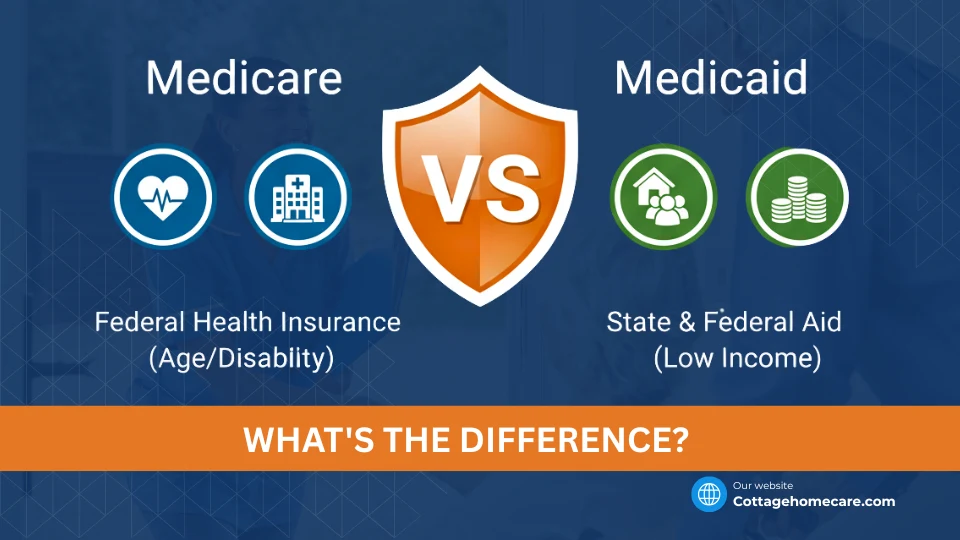
Cottage Care Blog
Medicare vs Medicaid: Understanding Your Healthcare Options
By Cottage Home Care Services
0Comment

Understand the Differences Between Medicare and Medicaid
Medicare vs. Medicaid Explained: Your Clear Guide to the Differences
Understanding health coverage options is crucial for everyone, especially as we age or face health challenges. Two of the most common programs providing health coverage in the U.S. are Medicare and Medicaid . While they sound similar, these programs serve different populations and have different benefits. In this guide, we’ll break down the key differences between Medicare and Medicaid to help you make informed decisions for your health and finances.
Introduction: Demystifying Health Coverage
When it comes to health insurance in the U.S., many people often confuse Medicare and Medicaid due to their similar names. However, they are two distinct programs with different eligibility criteria, coverage options, and cost structures.
- Medicare is primarily for individuals over the age of 65, as well as those with certain disabilities.
- Medicaid , on the other hand, serves individuals and families with limited income and resources, regardless of age.
By understanding these two programs, you can ensure that you or your loved ones receive the health care benefits they need without any confusion. This guide will help you navigate through the complexities, explain eligibility, coverage, and costs, and provide you with the knowledge needed to choose the best program for your circumstances.
What This Guide Will Cover
- Core differences between Medicare and Medicaid
- Eligibility requirements for both programs
- Coverage options and benefits
- Costs associated with both programs
- The intersection of Medicare and Medicaid (dual eligibility)
- Enrollment procedures and resources
What is Medicare? A Federal Health Insurance Foundation
Medicare is a federal health insurance program designed primarily for individuals aged 65 and older. It is also available to younger individuals with certain disabilities or health conditions like End-Stage Renal Disease (ESRD).
Purpose and Administration
- Administered by: The federal government (Centers for Medicare & Medicaid Services - CMS).
- Eligibility: Age 65+ or younger individuals with specific disabilities.
- Coverage: Primarily covers hospital care, medical services, and some prescription drugs.
Medicare’s goal is to provide health insurance to seniors and individuals with disabilities, enabling them to access necessary medical care without the overwhelming financial burden.
Who Medicare Serves: Eligibility Based on Age, Disability, and Specific Conditions
- Primary Eligibility: People aged 65+.
- Disability Eligibility: Younger individuals under 65 who have been receiving Social Security Disability Insurance (SSDI) benefits for at least 24 months.
- Special Conditions: Individuals with ESRD or ALS (Amyotrophic Lateral Sclerosis).
The Structure of Medicare: Original Medicare and Medicare Advantage
- Original Medicare (Parts A & B): Includes hospital insurance (Part A) and medical insurance (Part B).
- Medicare Advantage (Part C): Offered through private insurers, combining Parts A, B, and often Part D (prescription drugs), with additional benefits like dental and vision care.
| Medicare Parts | Coverage |
|---|---|
| Part A | Hospital Insurance (Inpatient Care, Hospice, Skilled Nursing) |
| Part B | Medical Insurance (Outpatient Care, Doctor Visits) |
| Part C | Medicare Advantage (Combines A, B, and D, with Extra Benefits) |
| Part D | Prescription Drug Coverage (Optional) |
What is Medicaid? A Joint Federal-State Safety Net
Medicaid is a joint federal and state program that provides health insurance for people with limited income and resources. It serves individuals of all ages, with different eligibility criteria depending on the state.
Who Medicaid Serves: Eligibility Based Primarily on Income and Resources
- Primary Eligibility: Low-income individuals and families.
- Extended Eligibility: Pregnant women, children, elderly individuals, and people with disabilities.
- State Variations: Eligibility and benefits vary by state, but all states cover a minimum set of services.
Scope of Coverage and Flexibility
Medicaid offers a comprehensive range of health care services:
- Inpatient and outpatient care
- Prescription drugs
- Maternity and newborn care
- Long-term care services like nursing home care and home-based care
- Behavioral health services, including mental health and substance use disorder treatments
| Medicaid Services | Coverage |
|---|---|
| Hospital and Doctor Visits | Full Coverage for Most Medical Services |
| Long-Term Care | Nursing Homes, Home Health, Hospice |
| Prescription Drugs | Free or Low-Cost Medications |
| Mental Health Services | Counseling, Therapy, Substance Use Programs |
Eligibility Compared: Who Qualifies for What?
- Medicare Eligibility: Available to individuals aged 65 or older, those with disabilities, and those with ESRD or ALS.
- Medicaid Eligibility: Available to low-income individuals, families, and those with disabilities, with eligibility varying by state.
Coverage Compared: What Services Do They Offer?
While Medicare and Medicaid offer different services, both programs provide essential health care to those in need. Medicare primarily covers inpatient and outpatient care, while Medicaid offers a broader array of services, including long-term care and behavioral health services.
Understanding the Costs: A Financial Breakdown
- Medicare Costs: Includes premiums, copays, and deductibles, with specific cost-sharing mechanisms in place for Part A, Part B, Part C, and Part D.
- Medicaid Costs: Typically free or low-cost, with minimal financial barriers for enrollees.
The Intersection: When You Have Both (Dual Eligibility)
Some individuals qualify for both Medicare and Medicaid. This combination of coverage, known as dual eligibility, offers individuals more comprehensive health coverage. Medicare pays first for covered services, while Medicaid covers additional costs.
Enrollment and Application: Getting the Coverage You Need
- Medicare Enrollment: Most individuals are automatically enrolled when they turn 65 if they are already receiving Social Security benefits.
- Medicaid Enrollment: Individuals must apply through their state Medicaid office, with eligibility based on income and state-specific rules.
Where to Find Help and Resources
- Visit Medicare.gov for information and application details.
- Contact your state Medicaid office for more details on Medicaid eligibility and services.
FAQ: Frequently Asked Questions
- What’s the main difference between Medicare and Medicaid?
Medicare is a federal program primarily for people aged 65 and older or younger individuals with disabilities. Medicaid is a joint federal-state program aimed at low-income individuals of all ages.
- Can I have both Medicare and Medicaid?
Yes! Dual eligibles qualify for both Medicare and Medicaid, with Medicare paying first for covered services and Medicaid covering additional costs.
- How do I qualify for Medicare vs. Medicaid?
Medicare eligibility is based on age or disability, while Medicaid eligibility is based on income, resources, and state-specific rules.
- Does Medicaid cover long-term care?
Yes, Medicaid covers long-term care services, including nursing home care and home health care. Medicare typically does not.
- Are there any cost-sharing options with Medicare?
Yes, Medicare includes premiums, copays, and deductibles, with Medicare Savings Programs (MSPs) to help reduce costs for eligible individuals.
Conclusion: Making Informed Decisions About Your Health Coverage
In conclusion, understanding the differences between Medicare and Medicaid is crucial for ensuring you have the right health coverage. Here’s a recap:
- Medicare is for seniors and those with disabilities, providing health coverage for hospital stays, outpatient care, and prescription drugs.
- Medicaid is for low-income individuals and families, offering a more comprehensive service array, including long-term care.
Before making any decisions, it's essential to assess your individual eligibility, health care needs, and financial situation. Don't hesitate to seek advice from official sources like Medicare.gov or your state Medicaid office to ensure you're getting the coverage that best fits your needs.
At Cottage Home Care Services, we are committed to guiding you through your health coverage decisions with compassion and care. If you need further assistance or have any questions, feel free to contact us for free guidance—we're here to help you navigate the process.
Contact Information:
- Website: Cottage Home Care Services
- Phone: 516-367-2266
- Email: info@cottagehomecare.com
Let us be your trusted partner in making the best choices for your health and well-being. We're here for you, every step of the way.
Recent Posts
Categories
Related Topic
difference between Medicare and MedicaidMedicare vs Medicaideligibility for Medicare and MedicaidMedicare coverageMedicaid coverageMedicare benefitsMedicaid benefitshealthcare options for seniorsMedicaid eligibility requirementshealth insurance for low-income familiesMedicare vs Medicaid comparisonMedicare and Medicaid near meMedicaid vs Medicare eligibility near mehealth insurance assistance near me
0comments
COMMENT SECTION
